|
|
|
Sort Order |
|
|
|
Items / Page
|
|
|
|
|
|
|
| Srl | Item |
| 1 |
ID:
192630
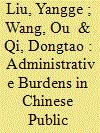

|
|
|
|
|
| Summary/Abstract |
The non-take-up of public services has the potential to undermine civil rights and deepen social inequality. Looking at the case of the Youth Community College Programme in China, an innovation in governance to facilitate community integration of the migrant population by providing free education, this study finds that the targeted disadvantaged groups are systematically excluded due to the disproportionate imposition of various administrative burdens on them. We propose that an interaction mechanism – which we term “selective affinity” – between the policy process and individuals’ human capital leads to this unintended outcome. The study contributes to a deeper understanding of the causal mechanisms underlying vulnerable people's non-take-up of public services, while highlighting an example of dysfunctional state–society interaction and a mechanism for the reproduction of social inequality under authoritarianism in China.
|
|
|
|
|
|
|
|
|
|
|
|
|
|
|
|
| 2 |
ID:
192628


|
|
|
|
|
| Summary/Abstract |
Under President Xi Jinping, the strengthening of the Chinese Communist Party's political control occurs in conjunction with an evolving administrative role for government-affiliated associations. Analysing associations that are subordinate within China's strict hierarchy but which have degrees of operational freedom yields insights into the changing nature of public service and administration in China. Evidence from 63 interviews conducted from 2018 to 2022 with government departments and affiliated associations in the education sector reveals the complexity of state control and degrees of constrained autonomy achieved by affiliated associations. The government exerts control over financing, personnel appointments and core business activities but, over time, associations gain varying degrees of operational autonomy to influence the education agenda and fill gaps in public services. The interdependency and relational variance we find in the case of Ministry of Education-affiliated associations contributes to broader understandings of the complex and fragmentary nature of the Chinese state and public administration.
|
|
|
|
|
|
|
|
|
|
|
|
|
|
|
|
| 3 |
ID:
192624
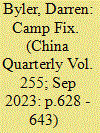

|
|
|
|
|
| Summary/Abstract |
Industrial parks in north-west China occupy a liminal space between labour camps and private industry. Drawing on worker interviews, government documents, industry materials and images this article shows that for-profit public-private industrial parks have been built as part of a “camp fix” mechanism centred on detaining and “re-educating” Uyghurs and Kazakhs at the periphery of the nation. It argues that these industrial parks concentrate forms of repressive assistance and “dormitory labour regimes” that operate at other frontiers of Chinese state power and point these strategies of disempowerment towards a seemingly permanent, ethno-racialized underclass, producing a “re-education labour regime.” It further argues that the material infrastructures of these surveiled and policed spaces themselves are productive in enforcing the goals of the “camp fix”: the creation of high-quality, underpaid, docile and non-religious Muslim workers who are controlled through the built environment.
|
|
|
|
|
|
|
|
|
|
|
|
|
|
|
|
| 4 |
ID:
192632
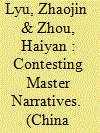

|
|
|
|
|
| Summary/Abstract |
The growing tension between mainland China and Taiwan has a cultural aspect closely related to national identity. We focus on recent history curriculum changes in the mainland and in Taiwan and find that education authorities on both sides have implemented master narratives for content selection in and organization of history textbooks. In mainland China, the master narrative of pluralist unity constructs a geographically consistent Chinese nation throughout history, which bolsters the state's current claim to a territorial integrity including Taiwan. In Taiwan, the master narrative of multiculturalism becomes the essence of Taiwanese identity, and weakens Sinocentrism in Taiwanese official historiography.
|
|
|
|
|
|
|
|
|
|
|
|
|
|
|
|
| 5 |
ID:
192629
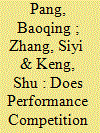

|
|
|
|
|
| Summary/Abstract |
How can China develop so quickly and yet maintain stability? Most scholars pinpoint the efforts of China's local government leaders as a primary factor. Regarding what motivates these leaders, however, scholars display wide disagreement. The widely accepted “promotion tournament” hypothesis stresses competition among local leaders as the driving force, but empirical test results vary considerably and create controversy. We argue that tests of promotion competition should target leadership behaviour rather than institutional inducements; the latter are, at best, a necessary condition of the former. Informed by extensive fieldwork, this study proposes an alternative and more direct approach to verifying the promotion tournament hypothesis by examining the impacts of promotion competition on leaders’ performance efforts. Our test results show, however, that competition for promotion has no significant impact on local leaders’ behaviour, thereby indicating that the promotion tournament hypothesis cannot be the primary explanation for China's economic achievements and regime resilience. In so doing, our study illuminates the oversimplified assumptions behind a prevailing proposition in Chinese politics and offers empirically informed insights into the tensions between political institutions and leadership behaviour.
|
|
|
|
|
|
|
|
|
|
|
|
|
|
|
|
| 6 |
ID:
192627
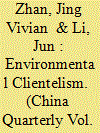

|
|
|
|
|
| Summary/Abstract |
China's environmental crackdowns under Xi Jinping have led to a sweeping shutdown of private enterprises. To circumvent this, enterprises have developed different survival strategies including direct lobbying to government officials and indirect lobbying through business associations. Based on comparative case studies of environmental lobbying in Chinese cities, our research finds that larger enterprises, enjoying more economic leverage, tend to lobby directly using their own political connections to sway environmental enforcement. By contrast, smaller enterprises are excluded from these clientelist networks and have to lobby through business associations, the effectiveness of which hinges on the support of large enterprises. Therefore, we argue that although the Chinese government's increasingly stringent environmental policies have shrunk the lobbying (and living) space for private enterprises, the existence of environmental clientelism protects economically powerful and politically connected private enterprises but sacrifices the others in the implementation of environmental policies.
|
|
|
|
|
|
|
|
|
|
|
|
|
|
|
|
| 7 |
ID:
192625
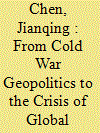

|
|
|
|
|
| Summary/Abstract |
This paper explores the genesis and growth of the current Chinese wireless network infrastructures by pulling together the historical threads of two telecommunications infrastructures: first, the development of the first-tier inter-provincial optical backbone, the “Eight Vertical and Eight Horizontal Fibre-optic Grid,” in the late 1980s and 1990s; and second, the deployment of two broadband-access cellular networks, the third-generation (3G) cellular networks in 2008 and the fourth-generation (4G) networks from 2013 to now, which constitute the wireless network's edges. I insert the development of Chinese wireless networks since the 1980s into the interconnected global technological environment, contextualizing the infrastructure deployment in the history of Sino-American technological cooperation and competition, traversing the final decade of the Cold War era (the 1980s), the dual global expansion of economic neoliberalism and informational technology since the 1990s and the crisis of global capitalism since 2008. This historical inquiry reconciles two historical (meta-)narratives that are not always compatible with each other – the Chinese narratives grounded on the overarching concept of Chinese post-socialism, and the narratives in Western discourses that often evoke Cold War/post-Cold War dialectics. This paper examines the global distribution of wireless network infrastructures on the basis of commercialization, technology transfers and trades of techno-commodities across borders, challenging the reduced depiction of the Chinese wireless network as an extension, or an exception, to the West-centred techno-capitalist system.
|
|
|
|
|
|
|
|
|
|
|
|
|
|
|
|
| 8 |
ID:
192620


|
|
|
|
|
| Summary/Abstract |
Rapid urbanization in 21st-century China has been fraught with contested demolition, overdevelopment and shoddy infrastructure with short lifespans. By viewing this infrastructure as having “high metabolism” and examining the urban scrap trade that is fuelled by its material outputs, this article challenges a common assumption that such a form of urbanization is merely wasteful and problematic. Crucially, such urbanization also puts rural migrants and scrap into motion in a way that helps to reproduce its form. This occurs by generating socio-material nodes of scrap trading wherein migrants make the most of temporarily stable situations with entrepreneurialism. The nodes are spaces of “suspension” shaped by challenges including cheap rental housing that is often targeted for demolition and frequent harassment from the authorities. However, the challenges do not prevent scrap traders from caring for kin, attending to human sentiments and sometimes achieving social mobility.
|
|
|
|
|
|
|
|
|
|
|
|
|
|
|
|
| 9 |
ID:
192619
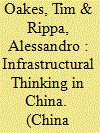

|
|
|
|
|
| Summary/Abstract |
Despite China's leading role in the construction of infrastructure over the past decades, the most influential paradigms for the study of infrastructure in the social sciences originate from research conducted elsewhere. This introduction to the special section “Chinese Infrastructure: Techno-politics, Materialities, Legacies” seeks to address this apparent gap, and contributes to building an innovative research agenda for an infrastructural approach in the China studies field. To do so, it pushes forward an understanding of infrastructure as both an empirically rich material object of research and an analytical strategy for framing research questions. We draw from two strands of inquiry: recent efforts to rethink the materiality of infrastructures not as an inert or stable basis upon which more dynamic social processes emerge, but rather as unstable assemblages of human and non-human agencies; and scholarship that explores the often hidden (techno-)political dimensions of infrastructures, through which certain intended and unintended outcomes emerge less from the realms of policy and implementation and more from the material dispositions and effects of infrastructural formations. These strands of inquiry are brought together as part of our effort to recognize that the infrastructural basis of China's approach to development and statecraft deserves a more concerted theorizing of infrastructure than we have seen thus far.
|
|
|
|
|
|
|
|
|
|
|
|
|
|
|
|
| 10 |
ID:
192631
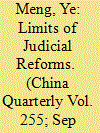

|
|
|
|
|
| Summary/Abstract |
This article investigates the implementation effects of China's recent reforms to centralize its court system and offers an explanation of why such centralization efforts largely failed. Drawing upon in-depth interviews with judicial personnel from four localities, the study shows that local courts’ structural dependence upon same-level party-states is perpetuated or, in some cases, is even exacerbated, despite the unprecedented reform plans to centralize the budgetary and personnel management of the judicial system. Further investigation finds that, contrary to what existing assessments suggest, implementation failure is less a result of regional disparities in resources than of the party-state's own reliance on its horizontal line of power concentration and hierarchy, which is a core feature of the Chinese Communist Party's (CCP) one-party rule and hinders the party-state's own attempts to strengthen both judicial autonomy and centralization. The article thus challenges two extant notions on recent political-legal developments in China – that the CCP regime has substantially centralized its judiciary along the vertical line, and that judicial autonomy can continue to increase and manifest both under the conditions of, and serving the purpose of, deepening one-party authoritarianism.
|
|
|
|
|
|
|
|
|
|
|
|
|
|
|
|
| 11 |
ID:
192622
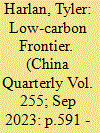

|
|
|
|
|
| Summary/Abstract |
China's west has long been framed as an undeveloped frontier, set apart by poverty and a resource-based economy. Since the 2000s, however, utility-scale renewable energy infrastructure has expanded rapidly in western China, promising local economic benefits tied to national low-carbon transition. This paper contends that these benefits have been precarious and unevenly distributed. I argue that utility-scale renewable energy has remade western China as a “low-carbon frontier,” a resource-rich region that generates low-carbon value for the national green economy. I highlight three features of low-carbon frontiers: they are constructed as spaces of exploitable low-carbon resources, creating an investment boom; they are enclosed through new land arrangements and infrastructure construction, rapidly and with little coordination; and they are reliant on external markets and policy decisions, entrenching dependency. These conditions make it difficult for frontier regions to capture sustained economic development benefits from the boom in the absence of persistent central state supports. I analyse these features by comparing two sets of technologies with similar, but ultimately diverging, trajectories: small and large hydropower in China's south-west, and solar and wind in the north-west.
|
|
|
|
|
|
|
|
|
|
|
|
|
|
|
|
| 12 |
ID:
192623
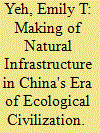

|
|
|
|
|
| Summary/Abstract |
Campaign-style environmental enforcement that involves the destruction of infrastructure has become increasingly common. Scholars have theorized such crackdowns as a form of bureaucratic control. These explanations are compelling, yet incomplete. This paper adopts an infrastructural lens to call attention to the fact of infrastructural demolition. I argue that the reduction of existing infrastructure to rubble is a way of clearing space for other kinds of infrastructure, specifically natural infrastructure, which has become central in the pursuit of ecological civilization. The creation of natural infrastructure requires calculative tools, which work to obscure the profoundly political nature of the natural infrastructure that they create through spatial zoning, ecological functional zoning and ecological conservation red lines (ECRLs). The article then scales down to two case studies of villages in post-earthquake Sichuan that are within ECRLs and designated for the function of providing ecosystem services. In both, infrastructure within scenic areas that was previously encouraged by the state and central to village livelihoods was suddenly destroyed following ecological civilization enforcement campaigns. The arrival of natural infrastructure marks a national-scale infrastructural time that promises a new future in which village-controlled scenic areas have no part, leading to a ruination of their imagined futures.
|
|
|
|
|
|
|
|
|
|
|
|
|
|
|
|
| 13 |
ID:
192621
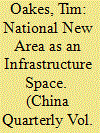

|
|
|
|
|
| Summary/Abstract |
This paper proposes an infrastructure analytic for exploring the urbanizing landscapes of China's “national new areas.” In an effort to develop a less city-centred approach to the transformations underway in these spaces, I consider the new area as an “infrastructure space” in which the conventional distinctions between rural and urban have become increasingly meaningless. Such an approach draws our attention to the ways large-scale infrastructures of connectivity are driving a decentred form of urban development in which the livelihoods of residents are shaped by access to networks more than proximity to city centres. Based on case-study research of urbanizing villages and the rapid transformation of rural livelihoods in Gui'an New Area in Guizhou province, I suggest that an infrastructure analytic sheds light on the ways national new areas can be understood as particular events in an unfolding regime of circulation that has come to dominate urban forms worldwide.
|
|
|
|
|
|
|
|
|
|
|
|
|
|
|
|
| 14 |
ID:
192626
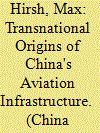

|
|
|
|
|
| Summary/Abstract |
This article investigates the role of foreign technical experts in developing China's aviation infrastructure from the 1980s to the present. Focusing on a series of training and technical aid programmes, it traces the influx of critical know-how from Europe, Japan and North America during the period of reform and opening up. Through fieldwork conducted at airports in Beijing, Hong Kong and Shanghai – and expert interviews with architects, planners and engineers – the article sheds light on the instrumental role played by foreign technical experts. By establishing a leading-edge set of airport planning practices, these aviation professionals accelerated the modernization of China's transport infrastructure and its reintegration into the world economy. Moreover, by positioning China as a global leader in infrastructure development, they laid the technical foundations for Chinese foreign policy endeavours that seek to export an infrastructure-led model of economic development to Africa, Asia and the former Soviet sphere.
|
|
|
|
|
|
|
|
|
|
|
|
|
|
|
|
|
|
|
|
|